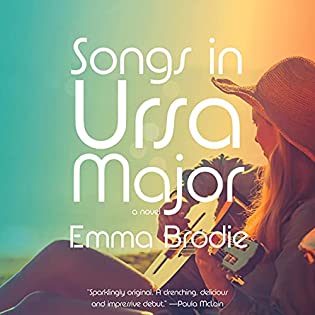I’m in spring break for school and catching up on some recent book reviews.
 Keep Moving: Notes on Loss, Creativity, and Change by Maggie Smith
Keep Moving: Notes on Loss, Creativity, and Change by Maggie Smith Published by Atria Books on October 6, 2020
Genres: Nonfiction
Pages: 224
Format: Hardcover
Source: Library
Buy on Amazon, Buy on Bookshop
This post contains affiliate links you can use to purchase the book. If you buy the book using that link, I will receive a small commission from the sale.
Goodreads
Perfect for fans of Anne Lamott and Cheryl Strayed, this is an inspiring and uplifting collection of essays and quotes on creativity and resilience by the award-winning author of the viral poem Good Bones.
When award-winning poet Maggie Smith started writing daily Twitter posts under the title “Keep Moving” in the wake of her divorce, they unexpectedly caught fire. People around the world connected to her short, inspiring quotes which brilliantly captured the complexities of the human heart. Funny, wry, and profound, Maggie’s writing has been and continues to be a form of healing for herself and countless fans.
Now, you can experience her outstanding and healing prose with this powerful and evocative collection. Featuring some of her most popular posts and essays, Keep Moving also includes new and never before published writing. Gorgeously and lovingly wrought, this is the perfect gift for anyone looking for a daily dose of optimism and spiritual nourishment.
This book is mostly encouraging aphorisms and short meditations. I found some of it helpful, hence four stars, but I prefer Maggie Smith’s poetry.
 David Copperfield by Charles Dickens
David Copperfield by Charles Dickens Narrator: Richard Armitage
Published by Audible Studios on February 9, 2016
Genres: Classic
Length: 36 hours 30 minutes
Format: Audio, Audiobook
Source: Audible
Buy on Amazon
This post contains affiliate links you can use to purchase the book. If you buy the book using that link, I will receive a small commission from the sale.
Goodreads
David Copperfield is the story of a young man's adventures on his journey from an unhappy and impoverished childhood to the discovery of his vocation as a successful novelist. Among the gloriously vivid cast of characters he encounters are his tyrannical stepfather, Mr Murdstone; his brilliant, but ultimately unworthy school-friend James Steerforth; his formidable aunt, Betsey Trotwood; the eternally humble, yet treacherous Uriah Heep; frivolous, enchanting Dora Spenlow; and the magnificently impecunious Wilkins Micawber, one of literature's great comic creations. In David Copperfield—the novel he described as his 'favourite child'—Dickens drew revealingly on his own experiences to create one of the most exuberant and enduringly popular works, filled with tragedy and comedy in equal measure.
My husband and I listened to this one. First, it’s completely easy to understand why this novel has always been popular and remains a classic. It’s a delight from start to finish. Betsey Trotwood has to be one of the most brilliant characters ever conceived, and David’s old nemesis Uriah Heep is horribly realistic (surely Charles Dickens knew a guy like this, right?). Richard Armitage’s narration is amazing. His acting talent is on full display in the various voices; his Uriah Heep is entirely unctuous. Every time he says “Uriah writhed,” you can feel it. Gross. To be fair, Dickens’s writing suffers a bit from the addition of an annoying-young-damsel-who-is-supposed-to-be-attractive-for-some-reason-no-one-can-figure-out. I noticed it in A Tale of Two Cities and to an extent in Great Expectations, but Dora takes the cake. I thought she was stupid and annoying and completely incompatible with David. What a cast of memorable characters. What a great book. I’m glad I finally read it.
 Songs in Ursa Major by Emma Brodie
Songs in Ursa Major by Emma Brodie Narrator: Kristen Sieh
Published by Random House Audio on June 22, 2021
Length: 10 hours 45 minutes
Format: Audio, Audiobook
Source: Library
Buy on Amazon, Buy on Bookshop
This post contains affiliate links you can use to purchase the book. If you buy the book using that link, I will receive a small commission from the sale.
Goodreads
A scintillating debut from a major new voice in fiction, Songs in Ursa Major is a love story set in 1969, alive with music, sex, and the trappings of fame.
Raised on an island off Massachusetts by a mother who wrote songs for famous musicians, Jane Quinn is singing in her own band before she's old enough to even read music. When folk legend Jesse Reid hears about Jane's performance at the island's music festival, a star is born—and so is a passionate love affair: they become inseparable when her band joins his on tour. Wary of being cast as his girlfriend—and haunted by her mother's shattered ambitions—Jane shields her relationship from the public eye, but Jesse's star power pulls her into his orbit of fame. Caught up in the thrill of the road and the profound and lustful connection she has with Jesse, Jane is blind-sided by the discovery she makes about the dark secret beneath his music. Heartbroken and blackballed by the industry, Jane is now truly on her own: to make the music she loves, and to make peace with her family. Shot through with the lyrics, the icons, the lore, the adrenaline of the early 70s music scene, Songs in Ursa Major pulses with romantic longing and asks the question so many female artists must face: What are we willing to sacrifice for our dreams?
I wanted to like this book more. It suffers from the fact that Daisy Jones & The Six and The Final Revival of Opal & Nev exist and it’s not as strong in comparison. This novel is sort of a thinly-veiled story of James Taylor and maybe Joni Mitchell set mostly on a fictionalized version of Martha’s Vineyard. I think there are some anachronisms to start with. For example, “What Would Jane Do” based on “What Would Jesus Do?” might be a bit out of time. While the WWJD saying goes back to the 1800s, its resurgence only dates to the 1990s. It felt out of place for Jane Quinn’s fans to pick it up. At one point, Jane’s record label guy (I forget what exactly his role was, but he discovered Jane) had an answering machine. I guess they existed prior to the 1980s, but they were not widely used. The fact that things DID exist doesn’t mean they were WIDELY USED, hence the feelings of anachronism. These were the two most glaring issues, but they were not the only ones. The other issue was a spoilery plot point. I won’t divulge it, but it felt like a cheat when it was revealed because the author used third-person limited and focused on Jane. It’s one thing for Jane to keep something from Jesse, but it’s another for her to keep it even from the reader. I understand why the author felt the need to save the secret, but I didn’t like the way it was handled, and it was at that point that the book lost me. If you’re going to have a protagonist lie to the reader, you need to pull it off with a bit more finesse. I finished it because I’d become invested, and I did enjoy part of the journey, which is why it ultimately landed on 3.5 stars.